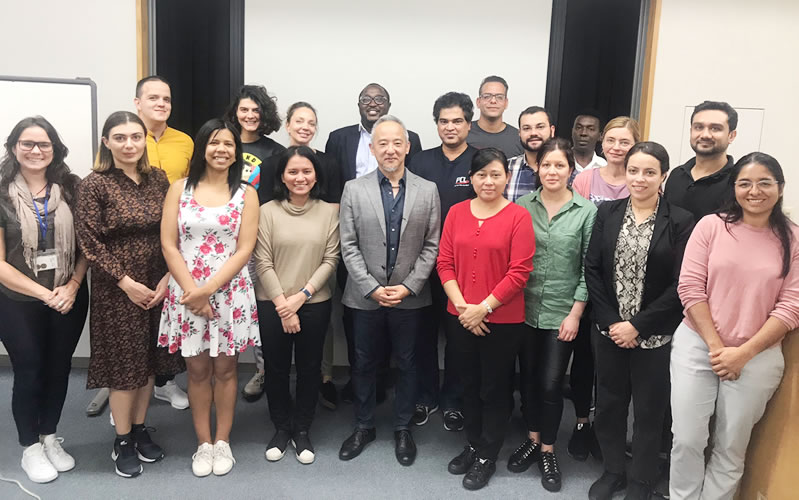National borders never kept us from connecting.- PREX Island
Lecturers / Specialists
【Voice of Professional】Dr. Goto, Professor of the Faculty of Economics, Kansai University
COVID-19. The virus affected our economy, environment, global relationship, and needless to say our daily lives. We, every each of us are in difficulties in some aspects. Then, what can we do for ourselves? And what can we do for others with/after corona? At least, we do not want to forget the mind of cooperation to build our better society.
Dr. Kenta GOTO, a professor of the Faculty of Economics, Kansai University, cooperating us to give lecturers about global economy in the seminar has recently shared his message on his facebook when his short essay was published at http://www.yuhikaku.co.jp/shosai
(this is in Japanese).

(Dr. Goto, Fifth person from the right)
Message from Dr. GOTO
I hope you are well. Just a quick note on this particular post, which is about a short essay I contributed to one of the outlets of a Japanese academic publisher, in Japanese. The gist is as follows (sorry for its length).
The piece is part of a “relay-essay” series by six co-authors of a book on the Asian economy (also in Japanese), of which I had the privilege to edit with three other colleagues. The book came out in the spring of 2018, and it focuses on the drastic economic and social transformations that have taken place in the region since the turn of this century. We see increased connectivity (goods, money, people, and information) as fundamental, underpinning the dynamism of the contemporary Asian economy.
Emerging regional challenges
The essays were intended for us to capture and reflect on the emerging regional challenges that have become evident since, from our own particular disciplinary perspectives.
So I have contextualized my line of arguments in light of the cascading series of (largely disturbing) international events such as the US-China trade disputes in 2019, which have caused major setbacks in regional integration in general, and the functioning of global value chains in particular, on which the livelihoods of millions, if not billions, depend.
And then this year, there came the coronavirus, which spread is not showing any signs of a slowdown globally, to date. It has become increasingly clear that the disease (COVID 19) has been affecting the most vulnerable disproportionately, often in the cruelest way.
Think, for instance, of those affected by the virus and not being able to receive appropriate medical attention, because of the absence of (or lack of access to) health care and social protection; of the millions in the informal economy who simply cannot afford to take social distancing measures and stay at home during lockdowns; and of those who may see their businesses rolling back and livelihoods crumbling as a result of restructuring and re-shoring of value chain activities to developed countries.
National borders never kept us from connecting
What is now at stake is not just the future prospects of the exceptional economic performance of this region, but the very fabrics and sustainability of our communities, both within and beyond borders. Inward-looking solutions will simply not do. Global crises require global responses, in solidarity. With our future now increasingly difficult to foresee, we must remind ourselves that whatever progress we have made in the past were essentially based on the aspirations that motivated us to reach-out and collaborate.
National borders never kept us from connecting; evidence-based scientific knowledge did have a place in decision making; and integrity, trust, and mutual respect were the de-facto norms underlying human interaction. We need to admit that we have constantly failed to learn from history. But this time we must do much better (I, however, still remain hopeful). This is what I (kind of) wrote, in a nutshell.
By the way, an English version of our Japanese book will be coming out from Routledge (UK) under the title “The Asian Economy: Contemporary Issues and Challenges,” at the end of July. It does, however, not cover the recent events such as the US-China trade war and coronavirus, as it was written prior to these. FYI.
Cheers.
- Date : July 31, 2020
- Name : Dr. Goto
- job name : Professor of the Faculty of Economics, Kansai University


